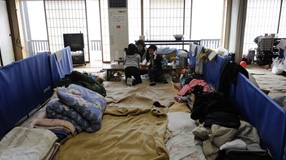Tens of thousands evacuated from around the stricken Fukushima Daiichi power plant may not be allowed home for months, a Japanese minister said on April 1, with no end in sight for the nuclear crisis as fresh concerns mount about alarming radiation levels in beef, seawater and groundwater.

While he didn't set a firm timetable, Chief Cabinet Secretary Yukio Edano said people who live within 20km (12 miles) of the nuclear facility could not return home permanently in "a matter of days or weeks. It will be longer than that."
About 78,000 people lived in the evacuation zone in northeast Japan, with another 62,000 in the 20-to-30km (12-to-19 mile) radius - the so-called exclusion zone, where people have been told to stay indoors and encouraged to leave - an official from Prime Minister Naoto Kan's office said.
The evacuees' plight is one of many storylines still playing out in relation to the crisis. Many are rooted to workers and soldiers while others rush to prevent a worsening disaster at the plant situated 240km (150 miles) north of Tokyo. Further afoot, farmers, citizens and officials are dealing with the effects of already released radiation.
More tests will be conducted on radiation levels in beef, as well as chicken and pork that came from the most affected areas.
As efforts continued on April 1 to cool nuclear fuel in reactors and spent fuel pools - using concrete pumping trucks and a new supply of fresh water from a US Navy barge that docked in waters outside the plant - concerns remained about other water sources that have shown high levels of radiation.
This includes water in exposed maintenance tunnels leading in and out of the Nos. 1, 2, 3 and 4 reactor buildings, one of which earlier had radiation levels 100,000 above the norm.
Authorities have been working in recent days to drain these tunnels, to prevent them from spilling over and sending tainted water into the ground. By April 1, an official with the Tokyo Electric Power Company - which operates the plant and heads the recovery effort - said water levels had dropped one or more meters, and that the issue was no longer urgent.
VOVNews/CNN

























